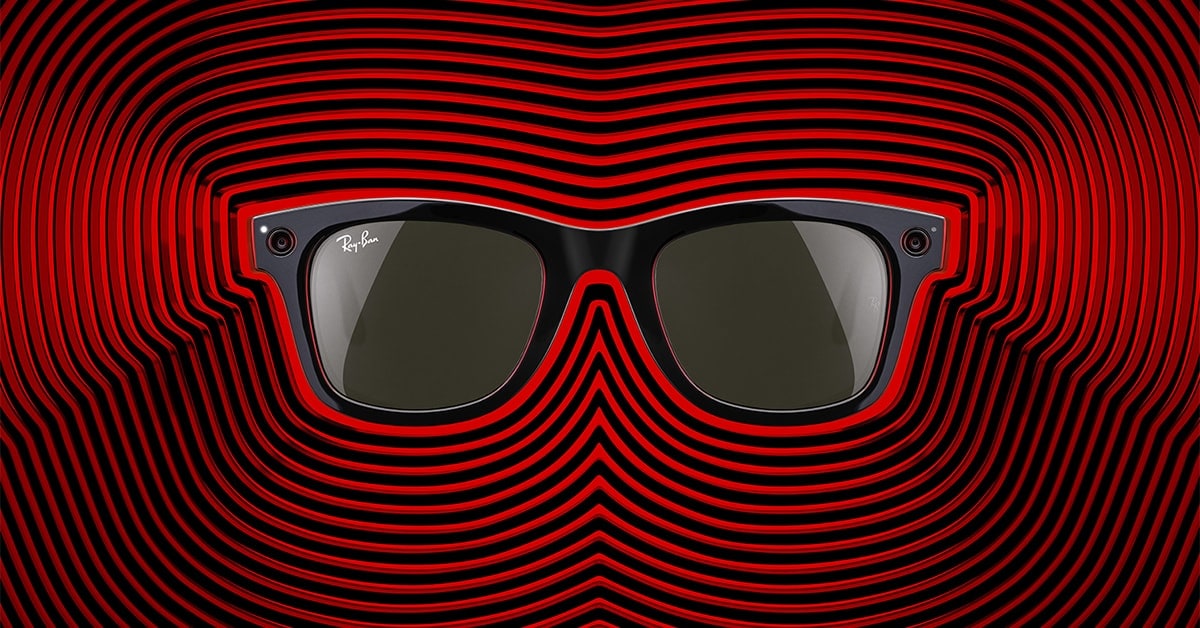Imagine that you are strolling along a tranquil beach in your swimsuit. Suddenly, a stranger walking toward you takes out their phone and starts recording you. You might work up the courage to ask how they dared to invade your privacy, and demand they delete the footage.
Fortunately, overt recording of people in public spaces is not as common as it could be, because it involves pointing a camera at someone. But it just became a lot easier with Facebook and Ray-Ban’s new mainstream tool to secretly surveil people: Stories smart glasses (as pictured above).
Below, we’ll unpack why you shouldn’t buy these wearable surveillance cameras, why they can’t be used safely in public spaces, and why Facebook and other companies need to prioritise human rights when developing “smart” glasses.
Surveillance spectacles for stalkers and spies
The new glasses, which look like a normal pair of Ray-Ban sunglasses, include “dual integrated 5MP cameras” that “let you capture life’s spontaneous moments.” People can take photos and up to 30-second videos using the capture button or hands-free with voice commands.
Importantly, there’s no obvious indication that the glasses are recording, beyond a tiny, white LED light that you cannot see from a distance in daylight. Ireland’s Data Protection Commission has even called on Facebook to demonstrate that this light is an effective way of notifying bystanders. We could save them the energy; it isn’t.
The obvious threat is that wearers can easily record others without their knowledge. Facebook and Ray-Ban say that they consulted “experts across academia and the privacy, safety, and civil liberties communities globally” for these glasses. Access Now participated in one of these “design jams” in May 2020, and our top recommendation — to prioritise alerting bystanders that they are being recorded — was ignored.
There are many better ways they could have made it clear recording is underway than a tiny white light. Why not a red light, which is typically associated with recording? Why not add a loud beep before recording starts? Or give them a unique design to distinguish them from normal Ray-Bans?

“Smart” = surveillance, and surveillance isn’t cool
If you’re considering buying a pair of these creepy glasses, ask yourself whether you really want to become another link in the growing network of surveillance cameras that surrounds us? There are already “smart doorbells” that share footage with law enforcement, and “smart lamp posts” that surveil protestors (and get torn down by them).
With smart glasses like these, it’s not enough to only consider the needs of people using the product; companies need to also prioritise the rights of bystanders who could be recorded, surveilled, and stalked by people wearing them. These glasses, with their stealthy recording capabilities, will exacerbate the harms of ubiquitous surveillance that fall disproportionately on marginalised communities.
Companies must anticipate and protect against disparate impacts of their products. This means looking at how their design choices impact marginalised communities or else these “smart” (a.k.a surveillance) gadgets risk amplifying oppression.
Facebook takes your privacy, seriously
There are other issues with these glasses beyond the impact on bystanders: what data they collect, how it’s stored, with whom it’s shared, and for what it’s used.
There is also the issue — which is becoming increasingly prominent as Facebook moves into the hardware market — that wearers of Ray-Ban Stories must link them to a Facebook account and use the Facebook View app to transfer photos and videos.
The Facebook View app may collect data on: health and fitness, purchases, finances, location, contacts, search history, sensitive data, and more. This means that wearers must give up deeply sensitive information for basic functionality. Of course, Facebook requires this to expand their rampant data harvesting practices. There is no technical need for the View app or for a Facebook account.
Facebook is essentially locking people into its walled garden by refusing to allow them to use this piece of hardware without consenting to privacy infringements. We’ve already seen this issue play out after Facebook’s acquisition of virtual reality (VR) hardware pioneer Oculus.
Since October 2020, new users of Oculus VR headsets need to login using a Facebook account, as opposed to an Oculus account. It’s also been reported that, starting in 2023, “full functionality” of its headsets will require a Facebook account. Other companies, like Apple, rely on this lock-in approach, which, ironically, has been vehemently criticised as anti-competitive behaviour by … Facebook.
Buyers of Ray-Ban Stories are not only relinquishing bystander privacy, but also their own.
First (mis)steps on the road to augmented reality
Facebook’s failure to prioritise human rights in designing this product is a worrying development, because it’s the company’s first step toward developing full-blown augmented reality (AR) glasses as part of Project Aria. Facebook, Apple, and many other companies see AR (and virtual reality) as fundamental to the “next generation of computing.” According to some predictions, AR glasses are poised to become the next iPhone, redefining how we connect to the internet and to one another.
As we’ve previously noted, AR can have many cool, beneficial applications. But if it’s done wrong, it can be the next frontier of human rights violations. We have the opportunity to design AR glasses with privacy and other human rights at their core, or we can prioritise sales and profit margins above everything else. The debacle of Ray-Ban Stories shows that, despite big claims about ensuring that the next generation of computing is developing responsibly, Facebook’s priorities lie with its own bottom line, rather than with protecting our rights.
So, if you’re thinking about buying a pair of these creepy surveillance spectacles, think again. Don’t support a product that disregards people’s rights and adds another link to the surveillance panopticon.
Images by: Tech@Facebook
